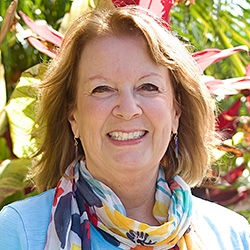

Search Results: connection
-
Trainer Tip: Next time someone asks how you're doing, you can check in with yourself and offer an honest answer. It doesn't need to be 15-minute response. You could say, "I’m feeling tired and overwhelmed by this project. I’m sure it'll work out. I’m just worried about it now. How are you?” If you're ready to do that, then you can be honest with yourself. Doing this can help you be present to how you are, and hold your experience as a gift to self and others.
-
What do we do when someone speaks to us in a way that doesn’t feel respectful? In this video, Oren Jay Sofer explores how NVC invites us to listen for the feelings and needs behind harsh or judgmental words — not because we “should,” but because it gives us more choice and freedom in how we respond.
-
Discover how Nonviolent Communication helped integrate spirituality into daily life and work.
-
Susan Skye unpacks the need for respect, offering clarity for requests and personal experience.
-
Sylvia teaches emotion management, connecting feelings to needs, and "Screaming in Giraffe."
-
Learn how to move from blame to understanding when needs aren’t met.
-
Exploring how empathy and honesty work together as essential parts of NVC practice.
-
Exploring how NVC can support healing and connection in places deeply affected by violence.
-
Trainer Tip: See imperfect NVC moments as learning opportunities, not failures.
-
Ask the Trainer: Can all needs be met when illness limits the capacity of one person to meet the needs of her partner?
-
Ask the Trainer: How do I respond to people who believe that consequences are necessary to change behavior?
-
Ask the Trainer: Is it a good idea to use NVC on persistent guilt, anger or depression without the aid of others?
-
In a recent vacation in a Mexican village, I was surprised to find myself in the midst of a community in mourning. Two days before I came, a 21-year-old girl had died in a car accident. Everyone in the town knew her and was openly affected by her death.
-
CNVC Certified Trainer Arnina Kashtan talks about what she calls "witnessing humanity," touching on the gift of presence, empathy vs. identification and staying present in the face of intensity.
-
An interviewer shares his reaction to the term Nonviolent Communication after a workshop.
-
Learn the two core aspects of NVC: consciousness and tools to express it.
-
There are four components to the Nonviolent Communication (NVC) model, as developed by Marshall Rosenberg, PhD. The 4-Part NVC Process can guide you to express how you are, or they can be used to empathically receive how another is.
-
Listen to this captivating story by Leo Sofer. A strong blacksmith comes to the aid of a little girl when she needs protecting. But can he protect her from the harsh words she speaks to herself inside her head?
-
Listen to three interwoven tales of love, vulnerability, courage and healing by CNVC Certified Trainer and Storyteller Leo Sofer.
-
CNVC Certified Trainer Miki Kashtan talks with radio show host Hollis Polk about strategies for communicating with family members whose political views oppose our own.
Quick Links

Stay in Touch!
We value your privacy, won't share your email address and you can easily unsubscribe any time.




















